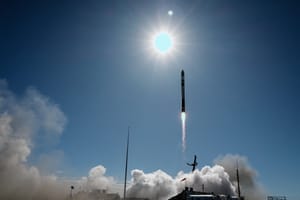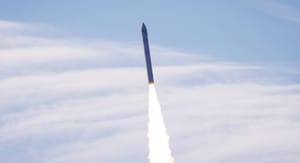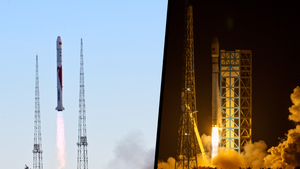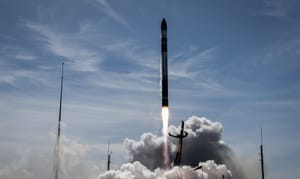
Dec 16, 2023
Rocket Lab returns to flight with 'The Moon God Awakens'
On the 15th of December 2023 at 04:05 am (UTC), Electron lifted off from Launch Complex 1 on the Mahia peninsula in New Zealand. The return-to-flight launch carried a satellite from iQPS, called TSUKUYOMI-I, to low Earth orbit for the forty-second launch attempt of Electron.
The TSUKUYOMI-I satellite is a QPS-SAR, synthetic-aperture radar, spacecraft used to collect high-resolution images of Earth below. The spacecraft is part of a planned constellation of thirty-six satellites operated by iQPS.

The Electron rocket's first and second stages performed as planned with the kick-stage placing the payload into a circular 575-kilometer orbit. This Electron also featured new safeguards to prevent another failure after the forty-first mission failed at second-stage engine startup.
The forty-first electron launch failed due to an electrical arc inside the second-stage engine power supply system leading to the battery being shorted. Rocket Lab Cheif Executive Office and Founder, Peter Beck, said the solution and mitigation of the failure was, according to Spaceflight Now:
"Increasing the fidelity of the second stage and sealing the battery frame that contains the high-voltage connections and equipment as well as pressurizing it to roughly 0.5 PSI."
What is Electron?
Electron is a two-stage launch vehicle developed by Rocket Lab. Electron utilizes the first electric-pump-fed engines to power its small rocket on both stages and is made of carbon fiber for its tanks.
The first-stage is powered by nine Rutherford engines generating 23 tons of thrust burning rocket-grade kerosene and liquid oxygen. The second-stage is powered by a single vacuum version of the Rutherford engine generating 2.6 tons of thrust also burning rocket-grade kerosene and liquid oxygen.
Rocket Lab claims Electron can launch 300 kilograms into low Earth orbit or 200 kilograms into Sun-Syncronous orbit.
Rocket Lab also currently plans to recover Electron's first stages to increase its launch cadence. For its planned recovery, Electron lands in the ocean under a parachute unlike SpaceX's Falcon 9 which lands propulsively at sea or on land. Rocket Lab recovers the rocket under a parachute to reduce engine wear and maintain payload capacity.
Who is Rocket Lab?
Rocket Lab is an American spaceflight company founded in June 2006 and headquartered in Long Beach, California. Rocket Lab currently operates the Electron small satellites launch vehicle and Photon satellites bus.
The company also owns a number of other spaceflight companies in the hopes of providing an end-to-end solution for spacecraft. Rocket Lab is also developing a larger rocket called Neutron.




